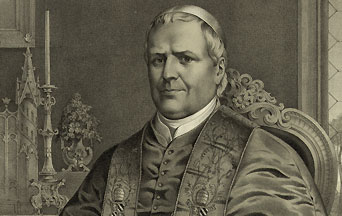
There is a lot of confusion about the nature and scope of the charism of the Pope’s infallibility.
Many Catholics with average religious instruction think the Sovereign Pontiff is infallible in everything he says or does. However, this is not what Catholic doctrine affirms.
Two Different Concepts That Are Often Confused
Thus, most Catholics confuse infallibility and impeccability. These are two different privileges:
Infallibility is immunity from error.
Impeccability is the state of being incapable of sinning. The person becomes unable to sin.
Science Confirms: Angels Took the House of Our Lady of Nazareth to Loreto
The first (infallibility) was granted to the Pope; the latter (impeccability) was not.
Only Our Lady was given this unique privilege of impeccability: in addition to being conceived without Original Sin. Indeed, Mary, by a special privilege of God, was free from all sin, even venial sin, during her entire life.
Even Saint Peter, the first Pope and an Apostle, was not exempt from the weaknesses due to Original Sin, as was witnessed when Saint Paul “resisted him to his face” (Gal. 2:11) because of certain ambiguous disciplinary measures due to his shortcomings and weaknesses.
The Necessary Conditions for Infallibility
Thus, not everything Popes say or do is infallible. Certain conditions must be met for a statement to be in itself infallible.
The Constitution Pastor Aeternus of the First Vatican Council (1869-1870), contains the definition of papal infallibility. The document affirms that the Pope is infallible “when he speaks ex cathedra, that is, when carrying out the duty of the pastor and teacher of all Christians by virtue of his supreme apostolic authority, he defines a doctrine of faith or morals to be held by the universal Church.”1
 Learn All About the Prophecies of Our Lady of Good Success About Our Times
Learn All About the Prophecies of Our Lady of Good Success About Our Times
There are four necessary conditions for a pronouncement of the pontifical Magisterium to be infallible:
- that the Pope speaks as universal Doctor and Shepherd;
- that he uses the fullness of his apostolic authority;
- that he expresses the will to define;
- that the matters defined deal with Faith or morals.
Any pronouncement that does not meet these four requirements does not enjoy immunity from error. Of course, these four conditions are not present in most acts and documents of the ordinary pontifical Magisterium. Even less in the words, gestures and attitudes of the Popes in their daily lives.
Seeing the Church As She Is
In addition, infallibility is a faculty that resides in the person of the Pope who is endowed with intelligence and free will. He may or may not use this power as he wishes.
The same Constitution Pastor Aeternus establishes the limits of papal infallibility: “[T]he Holy Spirit was not promised to the successors of Peter that by His revelation they might make known new doctrine, but that by His assistance they might inviolably keep and faithfully expound the Revelation, the Deposit of Faith, delivered through the Apostles.”
Eternal and Natural Law: The Foundation of Morals and Law
Thus, the faithful must consider the Church as Our Lord Jesus Christ made and established Her, not as they imagine Her to be. Pious Catholics should know, love, admire and revere Her as She actually is: the Mystical Body of Christ. Catholics should admire the Church in the infallibility of Her dogmas, the sanctity of Her sacraments, Her unity and the catholicity of Her mission. This love, admiration, and reverence, however, should not lead them to try to hide the shortcomings and imperfections that may exist in Her human element.
The Human Element Does Not Obscure the Divine
Indeed, Christ allows such shortcomings, as Pope Pius XII states:
“And if at times there appears in the Church something that indicates the weakness of our human nature, it should not be attributed to her juridical constitution, but rather to that regrettable inclination to evil found in each individual, which its Divine Founder permits even at times in the most exalted members of His Mystical Body, for the purpose of testing the virtue of the Shepherds no less than of the flocks, and that all may increase the merit of their Christian faith.”2
The Sublime Moment of the Archangel’s Annunciation to Our Lady
The Church Herself, in the Litany of the Saints, recognizes this capacity to stray from the right path when She invites the faithful to pray that the Holy Father and the other pastors do not depart from the true religion:
| Ut domnum Apostolicum et omnes ecclesiasticos ordines in sancta religione conservare digneris, R. Te rogamus, audi nos. |
That Thou wouldst preserve the Bishop of the Apostolic See, and all orders of the Church in holy religion, R. We beseech Thee, hear us. |
Thus, the human element of the Church may fail and even fail gravely since the Pope and the hierarchy are not endowed with impeccability. As humans, they are capable of sin for, being endowed with free will, they may accept or reject the actions of grace. However, the lack of papal impeccability does not affect papal infallibility.
Amid the present crisis, the faithful must always respect the Sacred Hierarchy, unconditionally adhere to the true Faith, and love with extreme dedication the Church, Who is the One who is completely fair and unstained in Her divine constitution and Her mystical and supernatural reality, being as She is the Spouse of Christ.
Footnotes
- First Vatican Council Constitution Pastor Aeternus. Available at http://www.catholicplanet.org/councils/20-Pastor-Aeternus.htm.
- Pope Pius XII, Encyclical Mystici Corporis Christi ─ On the Mystical Body of Christ, June 29, 1943, n. 66. Retrieved from http://www.vatican.va/holy_father/pius_xii/encyclicals/documents/hf_p-xii_enc_29061943_mystici-corporis-christi_en.html.

